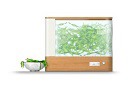Seaweed is a popular component in Asian dishes. Fans of algae and people in general who want to integrate these into their diet will be able to grow them at home in the future. A research team at TH Köln is working on a bioreactor in which edible algae can be cultivated under marine conditions, in an environmentally friendly and resource-saving way.
Prof. Dr. Nina Kloster from the  Institute of Building Services Engineering is leading the project "NoriFarm - A tank system for urban macroalgae cultivation", which has received 100,000 euros worth of funding from the German Federal Ministry of Education and Research.
Institute of Building Services Engineering is leading the project "NoriFarm - A tank system for urban macroalgae cultivation", which has received 100,000 euros worth of funding from the German Federal Ministry of Education and Research.
Novel tank system
"The demand for information about the origin of purchased food has increased greatly. There is also a demand for people to grow their own food. One form of this is growing plants indoors, also called indoor farming," Kloster says. She heads the GreenING Lab at TH Köln, which focuses on biosystems for building applications. In the "NoriFarm" project, an interdisciplinary team from the lab is developing a novel tank system for cultivating pollutant-free and fresh edible macroalgae.
The table-top device resembles an aquarium. It enables domestic algae cultivation and is also suitable in perspective for restaurant operations or supermarkets. The bioreactor includes a tank with water that approximates marine conditions. Sensors monitor key properties of the water, such as nutrient content and pH levels, to ensure the production of a safe, high-quality food product. An app is designed to facilitate use, for example by reminding users to clean and harvest. Product development incorporates knowledge from biology, engineering, sustainable design and computer science.
Algae provide omega-3 fatty acids
One dietary ingredient vital to humans are omega-3 fatty acids. "Many people think of fish first. The omega-3 fatty acids in fish come from their food, algae, accumulating in the tissues of the fish. However, overfishing of the oceans, antibiotic-intensive fish farming and long transport routes are a major burden on the environment. Eating algae directly instead of taking the detour via fish represents an alternative and sustainable source of omega-3," Kloster explains.
The best-known macroalgae are nori and wakame, which are used primarily in Asian cuisine. "They are well suited for direct consumption. Availability in Germany is dependent on the production situation of other countries. The tropical macroalgae found in salt water can also be contaminated with heavy metals or pesticides," Kloster said.
The project will run until September 2022, and the production of the fully developed device is to be linked to the establishment of a company. StartUpLab@TH Cologne is supporting the project.
For more information:
www.th-koeln.de
